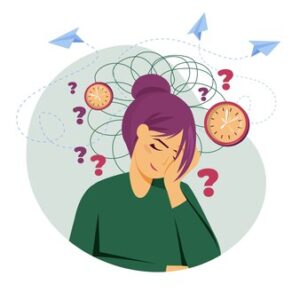There is a recognized association between attention deficit hyperactivity disorder (ADHD) and fatigue. While the precise cause of this link remains unclear, women with ADHD often encounter mental or physical tiredness, which, if not managed, can result in burnout.
This article aims to explore ADHD-related fatigue, it’s possible origins, the relationship between ADHD and burnout, and strategies to mitigate fatigue.
Can ADHD Cause Fatigue?
There is a notable connection between ADHD and feelings of tiredness or fatigue, with individuals often reporting higher levels of tiredness, stress, and fatigue compared to those without the condition. Some individuals may also experience central fatigue syndrome, characterized by persistent tiredness over time. Interestingly, women with central fatigue syndrome often exhibit symptoms of ADHD. Fatigue manifests differently for each person and can be either mental or physical, stemming from factors such as inadequate sleep or depression. Fatigue serves as a warning signal for the body. Experiencing fatigue indicates to the brain that it is time to rest
What Are the Symptoms of ADHD Fatigue?
ADHD fatigue often presents as both physical and mental exhaustion, accompanied by sleep difficulties. Some women may also experience physical discomfort and reduced awareness of body movements. Episodes of heightened ADHD symptoms can make relaxation and adequate rest challenging.
For many women with ADHD, fatigue can be overwhelming. Managing competing tasks and priorities becomes difficult, often leading to distractions, forgetfulness, and challenges in maintaining organization and focus.
Additional Symptoms and Challenges
Women with ADHD frequently struggle with maintaining focus and often expend more effort than others to complete tasks, remain organized, and achieve their objectives. This increased effort can result in persistent stress and challenges in coping effectively. ADHD is also associated with marital difficulties, workplace challenges, financial strains, and other obstacles.
Moreover, women with ADHD often express sensitivity to criticism, particularly in professional settings. Continuous criticism can be draining and contribute to feelings of burnout. Additionally, some individuals may experience boredom when not sufficiently stimulated, which can manifest as fatigue.
These symptoms and challenges highlight the multifaceted impact of ADHD on daily life and underscore the importance of effective management strategies and support.
How to Address ADHD Fatigue
Managing symptoms effectively and preventing burnout is crucial when dealing with ADHD-related fatigue. Here are some strategies to help combat ADHD fatigue:
Utilize tools like apps on computers and phones to help organize tasks and prioritize daily activities.
Maintain lists to track daily tasks, unfinished projects, thoughts, feelings, and other important matters that require attention.
Schedule regular breaks throughout the day and designate open time blocks to prevent mental exhaustion.
Engage in regular physical exercise to boost energy levels and improve overall well-being.
Identify and avoid triggers or factors that exacerbate ADHD symptoms.
These approaches can help individuals better manage ADHD-related fatigue and maintain productivity and well-being.
